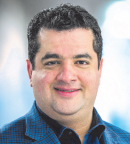For patients with relapsed large B-cell lymphoma (LBCL) in complete remission, outcomes were better after autologous stem cell transplantation (ASCT) than with chimeric antigen receptor (CAR) T-cell therapy in a retrospective analysis of a large database presented at the 2023 American Society of Hematology (ASH) Annual Meeting & Exposition.1
CAR T-cell therapy has become standard of care for relapsed LBCL as early as in the second line. But in this multivariate analysis of patients who had a complete response by fluorine-18 fluorodeoxyglucose (FDG) positron-emission tomography (PET) scan, CAR T-cell therapy was associated with a higher risk of relapse (hazard ratio [HR] = 1.83; P = .0011) and inferior progression-free survival (HR = 2.18; P < .0001), reported Mazyar Shadman, MD, MPH, Associate Professor in the Clinical Research Division and Innovators Network Endowed Chair at Fred Hutch Cancer Center in Seattle.

“These data could be practice informing and confirming.”— MAZYAR SHADMAN, MD, MPH
Tweet this quote
For ASCT vs CAR T-cell therapy, rate for relapse at 2 years was 27.8% vs 48.0%, respectively; progression-free survival rate was 66.2% vs 47.8%; and overall survival rate was 78.9% vs 65.6%. There was no significant difference in treatment-related mortality.
“These data could be practice informing and confirming,” Dr. Shadman said at an ASH press briefing. “In patients who relapse after first-line therapy after 12 months, the current standard of care is salvage therapy with autotransplant, and these data confirm that. There are currently no data suggesting that patients who are in complete remission should receive CAR T-cell therapy in that setting.”
Dr. Shadman and his colleagues previously showed that ASCT is superior to CAR T-cell therapy when patients achieve partial remission—an observation that provided the basis for the current retrospective comparison. The 360 patients from the Center for International Blood & Marrow Transplant Research registry were in complete remission after treatment for LBCL. A total of 281 patients underwent ASCT between 2015 and 2021, and 79 were treated with CAR T-cell therapy from 2018 to 2021. The ASCT group had a median of two prior lines of therapy, and the CAR T-cell group had three. In the CAR T-cell group, 53% received tisagenlecleucel, 46% received axicabtagene ciloleucel, and one patient received lisocabtagene maraleucel.
Further Clarification
During further discussion, Dr. Shadman emphasized that the patients were all in complete remission after initial relapse. Such patients may be referred for CAR T-cell therapy and, during bridging chemotherapy, they occasionally respond. “By definition, these patients are chemorefractory, but we do see, in practice, that despite being chemorefractory to other modes of therapy, some patients will have a complete response after one or two cycles of chemotherapy,” he explained.
“By definition, these patients are chemorefractory, but we do see, in practice, that despite being chemorefractory to other modes of therapy, some patients will have a complete response after one or two cycles of chemotherapy.”— MAZYAR SHADMAN, MD, MPH
Tweet this quote
This raises the question of whether, with presumed chemosensitive disease, the patient should continue to CAR T-cell therapy or undergo ASCT, with CAR T-cell therapy as a backup plan. “The goal of therapy should be CAR-T, and all efforts should be made to improve access to CAR-T. Until then, for patients who achieve a complete response, an autotransplant strategy could be a reasonable option to discuss and could add another potentially curative therapy for these patients, knowing that CAR-T could still be used later if autotransplant fails,” Dr. Shadman said. For patients with primary refractory disease, the preferred approach should be CAR T-cell therapy, and these patients would not be recommended for ASCT, he emphasized.
Key Findings
Median follow-up was 49.7 months for ASCT and 24.7 months for CAR T-cell therapy. The primary endpoints were progression-free survival and overall survival.
The results favored ASCT for most outcomes, at 2 years:
- Progression-free survival: 66.2% vs 47.8% (P < .001)
- Overall survival: 78.9% vs 65.6% (P = .037)
- Relapse/disease progression: 27.8% vs 48% (P < .001)
- Nonrelapse mortality: 5.9% vs 4.1% (P = .673).
An analysis of a subgroup of 244 patients with early relapse (within 12 months) after first-line therapy also favored ASCT for progression-free survival (68.2% vs 48.4%, P = .001) and relapse/disease progression (25.0% vs 46.3%, P < .001). Of note, the overall survival superiority seen in the entire cohort was not sustained with ASCT among those who relapsed within the first 12 months.
The most common cause of death in the ASCT and CAR T-cell therapy groups was lymphoma (60% vs 68%, respectively), followed by infections (16% vs 12%, respectively). The third most common cause of death was second malignancy in the ASCT group, at 3.5%, and pulmonary failure in the CAR T-cell therapy group, at 8%.
KEY POINTS
- For patients with relapsed large B-cell lymphoma in complete remission, outcomes were better after autologous transplant than after CAR T-cell therapy, according to a retrospective analysis of a large database.
- The patients were all in complete remission after initial relapse, and such patients typically go to CAR T-cell therapy. The occasional patient has a complete response to bridging chemotherapy and may do well after transplant.
- Transplant, therefore, is an option to consider in this subset of patients, with CAR T-cell therapy the next approach if transplant fails.
Dr. Shadman acknowledged the study was not a randomized comparison, and there may be confounders to the analysis, including the use of tisagenlecleucel in most patients, which is now considered a less effective CAR T-cell product.
In response to a listener’s question as to whether he could make a recommendation for practice, Dr. Shadman commented: “Ideally, we should have a randomized study of patients who receive a cycle or two of chemotherapy—if they don’t have a response, they get CAR-T, and if they do respond, then we look at CAR-T vs autotransplant. Then maybe we could make a stronger comment about changing practice.”
DISCLOSURE: Dr. Shadman reported financial relationships with ADC Therapeutics, Bristol Myers Squibb, Genmab, Eli Lilly, Vincerx, Kite, Janssen, Fate Therapeutics, MorphoSys/Incyte, AstraZeneca, BeiGene, Pharmacyclics, Mustang Bio, AbbVie, Genentech, MEI Pharma, Regeneron, and TG Therapeutics.
REFERENCE
1. Shadman M, Wooahan K, Kaur M, et al: Autologous transplant is associated with improved clinical outcomes compared to CAR-T therapy in patients with large B-cell lymphoma achieving complete remission. 2023 ASH Annual Meeting & Exposition. Abstract 781. Presented December 11, 2023.


